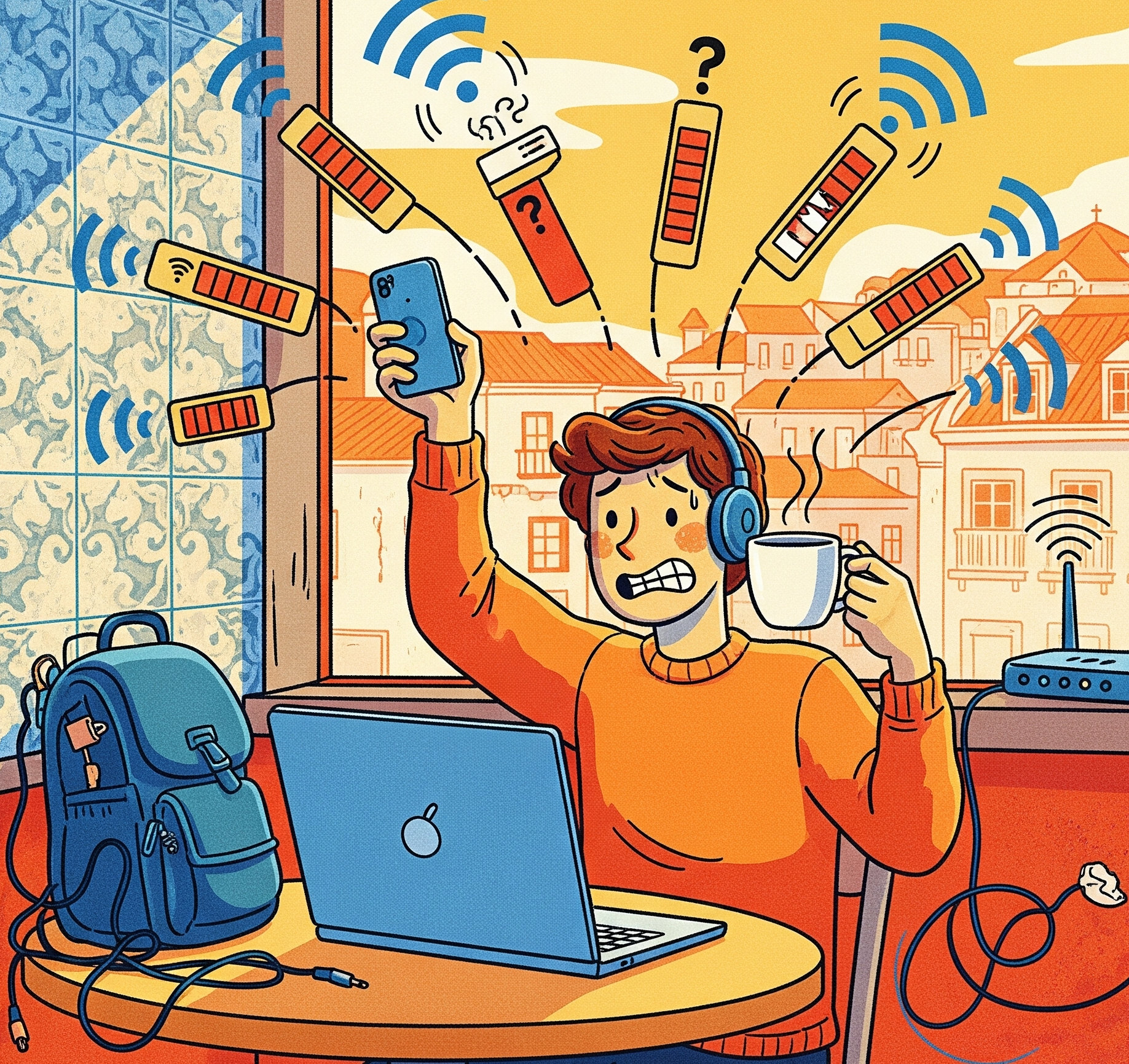Or: How I Learned to Stop Worrying and Love the Phrase “Can You Hear Me Now?”
There’s a special kind of panic that only digital nomads understand. It’s 11:58 PM, you have a client presentation in two minutes, and your WiFi has decided this is the perfect moment to explore its artistic side by performing an interpretive dance called “Connecting… Disconnecting… Connecting… Just Kidding, You’re Screwed.”
I’m writing this from a café in Lisbon where the WiFi password is “SuperFast2024!” The exclamation point, I’ve learned, is aspirational. Like calling a 300-pound man “Tiny” or naming your anxious chihuahua “Killer.” The WiFi here moves at speeds that would make a 1990s dial-up modem feel smugly superior.
The Universal Law of Remote Work
After five years of working from cafés, co-working spaces, and “luxury apartments with high-speed internet!” across three continents, I’ve discovered an immutable law of physics that somehow escaped Einstein:
The probability of your internet failing is directly proportional to the importance of your video call multiplied by the number of times you’ve assured your client that “remote work is seamless these days.”
Last Tuesday, I had three calls:
- 9 AM: Casual check-in with a colleague = Crystal clear 4K video quality
- 2 PM: Internal team brainstorm = Solid connection, no issues
- 4 PM: New client pitch worth $50k = I looked like a Japanese horror film shot through a potato
The WiFi Hierarchy of Needs
Forget Maslow. When you’re living abroad and working remotely, your hierarchy looks like this:
Level 1: Any WiFi
You’ll sit next to a bathroom in a McDonald’s if it means you can send an email. Dignity is a luxury you can’t afford when you have deadlines.
Level 2: WiFi That Actually Works
This is where you start getting picky. “Oh, the café has WiFi, but can it handle a Zoom call?” You become that person who asks to run a speed test before ordering coffee.
Level 3: Backup WiFi
You’re now sophisticated enough to have a mobile hotspot, know three nearby cafés with reliable internet, and maintain relationships with neighbors solely for emergency WiFi access.
Level 4: WiFi Redundancy System
You have two mobile hotspots from different carriers, a coworking membership, a list of hotels that let non-guests use their lobby WiFi, and you’ve memorized the municipal library’s hours in six different time zones.
Level 5: WiFi Enlightenment
You’ve accepted that the internet will fail at the worst possible moment. You pre-record important presentations, master the art of the “technical difficulties” excuse, and have learned to find zen in the spinning wheel of death.
The International Catalogue of WiFi Lies
“High-speed internet included!” – Translation: We have internet. Its speed is high compared to carrier pigeons.
“Perfect for digital nomads!” – Translation: We saw a laptop once.
“Fiber optic connection!” – Translation: There’s a fiber optic cable somewhere in the city. Not here, specifically, but somewhere.
“Dedicated workspace!” – Translation: There’s a table. It wobbles. The chair was designed by someone who hates the human spine. The router is from 2003.
“Recently upgraded WiFi!” – Translation: We turned it off and on again last month.
The Five Stages of WiFi Grief
Denial: “It’s probably just a momentary glitch. I’ll refresh.”
Anger: “I SPECIFICALLY ASKED ABOUT THE WIFI BEFORE BOOKING THIS PLACE!”
Bargaining: “Okay, universe, if you just let me get through this one call, I promise I’ll never complain about anything again.”
Depression: “Maybe I’m not cut out for this lifestyle. Maybe I should go back to a cubicle where the WiFi is stable and my soul slowly dies.”
Acceptance: “Hello, client? Yes, I’m calling from my phone while standing on my balcony holding my laptop at a 45-degree angle because that’s the only way to get signal. Shall we proceed with the quarterly review?”
Survival Strategies from the Trenches
The Café Rotation System: Never rely on just one café. Develop relationships with at least five, strategically located based on their WiFi reliability, coffee quality, and bathroom accessibility. Bonus points if the owner starts making your drink before you order.
The Emergency Kit: Always carry:
- Two different mobile hotspots (because Murphy’s Law states they’ll both fail, but at different times)
- A phone with enough data to bankrupt a small nation
- The phone numbers of three coworking spaces
- A list of every hotel lobby with accessible WiFi
- Noise-canceling headphones (because that reliable WiFi spot is always next to construction)
- No shame whatsoever
The Pre-Emptive Strike: Start every important call with: “Just a heads up, I’m traveling, so if we have any connection issues…” This sets expectations low enough that when you only drop out twice, you look professional.
The Time Zone Shuffle: Schedule important calls during your location’s “internet prime time” – usually early morning before everyone else wakes up and starts Netflix-ing.
The Silver Lining
Here’s the thing nobody tells you about the WiFi struggle: it makes you better at your job.
When you know your internet might crap out at any moment, you become ruthlessly efficient. No more hour-long meetings that could have been emails. No more “quick calls” that somehow eat entire afternoons. You learn to communicate clearly, prepare thoroughly, and get to the point.
You also develop skills that office workers never need:
- The ability to find WiFi like a truffle pig finds truffles
- Ninja-level phone hotspot management
- The skill to conduct a professional meeting while a mariachi band plays six feet away
- An encyclopedic knowledge of which VPNs actually work in which countries
- The patience of a Buddhist monk combined with the technical troubleshooting skills of a MIT graduate
The Truth Nobody Admits
Sometimes, when the WiFi dies during a particularly boring meeting, you don’t immediately switch to your backup connection. You sit there for a moment, in the blessed silence, and think, “Maybe this is the universe telling me this meeting really should have been an email.”
Then you reconnect, apologize profusely, and secretly plan your next move to a country with better internet infrastructure. I hear Estonia is nice this time of year.




